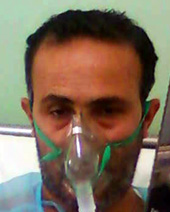Tunisian police arrested Fahem Boukadous, a widely respected critical journalist, on July 15. Before his arrest, Boukadous wrote an open letter from the hospital, where he was being treated for acute asthma. On the evening he was taken to Gafsa prison, his wife, Afaf Bennacer, wrote an article about what happened that has been circulated on multiple Arabic websites. Below is CPJ’s translation:
“Not for Sale”
A few hours after my husband was discharged from the hospital in Sousse, he received a phone call from Noureddine Ben Nticha, a former activist in the student movement who was imprisoned in the 1990s with my husband, Fahem Boukadous, in relation to the same case. Nticha called three times and insisted on meeting with my husband. We went out to meet him in a café in Sousse. This meeting was on Thursday, July 15, at 8:15 a.m. and there was a heavy security presence. We found him alone. He immediately began discussing the case, the ruling and its execution and the possibility of repealing it as well as granting my husband a national press card in return for writing a pardon request to the president, which he insisted be done in absolute secrecy and that the request be handwritten. He said there was a person parked and waiting outside the café who could explain the details of the “agreement.”
My husband responded by saying that he was an independent and internationally recognized journalist who was not interested in obtaining a national press card and that he could not accept such bargaining. At that point, Nticha made a sudden phone call. Someone named Burhan Bsaies walked into the café right after that call, shook our hands, sat down and started talking about my husband’s health, how it had deteriorated and that it was possible to treat him under better conditions and even abroad if necessary. He stood by the same offer and hinted to the financial benefits and good life my husband would receive. He also pointed out Fahem’s qualities, sincerity, and friendship with all civil society members. Fahem replied that he would not submit the request for pardon and that his freedom would be the fruit of the democratic movement’s strife at home and abroad. On that note, Fahem ended the conversation and we left them in the café and went out.
Ironically, he was arrested by the political police in Sousse about half an hour after we left the café. It is in this fashion that the regime and its servants deal with the country’s free people, offering to buy their integrity and detach them from the people and their issues. I feel that it is my duty toward my country and people that I should expose them. Fahem entrusted this task to me before the police car took him away.
